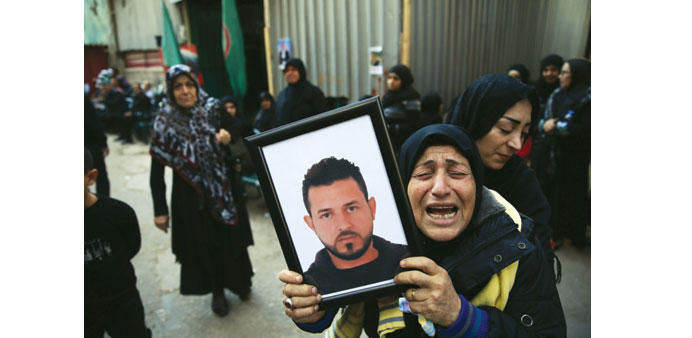A relative of Samer Huhu, who was killed in the twin bombing in Beirut on Thursday, holds his portrait as she mourns during his funeral in the Lebanese capital yesterday.
AFP
Beirut
Lebanon yesterday mourned 44 people killed in a Hezbollah bastion in south Beirut in a twin bombing claimed by the Islamic State group, the bloodiest such attack in years.
The Red Cross said at least 239 people were wounded, several in critical condition, in the blasts that hit a busy shopping street in Burj al-Barajneh, a neighbourhood where the Shia Hezbollah movement allied to Syrian President Bashar al-Assad is popular.
The attack harked back to a campaign against Hezbollah between 2013 and 2014, ostensibly in revenge for its military support of regime forces in Syria’s civil war.
But it was the largest attack ever claimed by IS in Lebanon, and among the deadliest bombings to hit the country since the end of its 1975-1990 civil war.
Hundreds of people attended funerals yesterday after hospitals started to hand over the bodies of victims to their families.
One victim, Adel Tarmous, was hailed as a hero in the newspapers for having prevented a bomber from entering a Shia place of worship.
Wrapped in Hezbollah’s yellow flag, he was buried in his native village of Talousa in south Lebanon near the border with Israel.
As Lebanon observed a day of national mourning, schools closed for the day and politicians across the fractured political spectrum condemned the attack.
The blasts ripped through a street market in the poor, mainly Shia Muslim neighbourhood, staining the ground red with blood.
One witness told local television: “When the second blast went off, I thought the world had ended.”
The army initially said there were two suicide bombers and a third bomber who failed to detonate his explosive device was found at the scene.
But IS gave a different version in a statement claiming responsibility for the attack that circulated online, and on Thursday Lebanese authorities said it was unclear if there had been three attackers or not.
IS said “soldiers of the Caliphate” first detonated explosives planted on a motorbike on the street.
“After the apostates gathered in the area, one of the knights of martyrdom detonated his explosive belt in the midst of them,” the statement added.
It made no reference to Hezbollah’s involvement in Syria, much of which is under IS control, instead using starkly sectarian language.
The attack would play “into their sectarian rubric, operationally and strategically it makes sense for the group”, IS expert Charlie Winter said.

